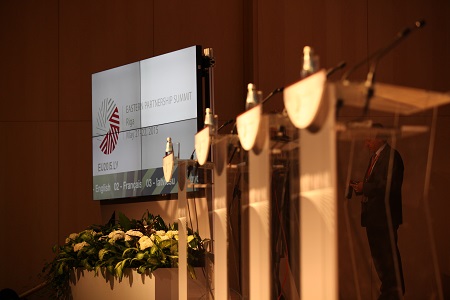What does the Riga Summit final declaration say on Georgia-EU future relations?

Participants of the Eastern Partnership (EaP) Summit in Riga have come to an agreement on the final text of the joint declaration after the several rounds of discussions between European leaders and their counterparts from EaP partner countries (Armenia, Azerbaijan, Belarus, Georgia, Moldova, and Ukraine).
The main and final document of the meeting consists of 30 points and includes several important messages on how Georgia can develop its relationship with the European Union (EU).
Summit participants acknowledge the European aspirations and European choice of the partners concerned, as stated in the Association Agreements,” states the declaration, released today.
The leaders’ decision on visa liberalisation for Georgia was one of the most anticipated decisions, as the most tangible result of the EU-Georgia deal signed in June 2014 for Georgian citizens would be visa free travel to countries in the Schengen zone.
Visa liberalisation
The declaration noted Summit participants "warmly welcome the progress made by Georgia and Ukraine respectively in the implementation of their Visa Liberalisation Action Plans (VLAP) as described in the latest Progress Reports by the European Commission”.
"They look forward to completion by Ukraine and Georgia of the implementation of the 2nd phase of their Visa Liberalisation Action Plans once all benchmarks are fulfilled through the implementation of all required reforms, and welcome the Commission's readiness to do its utmost to support Ukraine and Georgia in the implementation of their VLAPs and its intention to report on progress by Ukraine and Georgia respectively by the end of 2015,” stated point 23 of the joint declaration under the Mobility and People to People section.
"After all benchmarks are fulfilled and positively evaluated by the European Commission, the European Council will start law procedures to launch a visa free regime for the citizens of Georgia.” Experts on EU-Georgia integration assessed this wording as very positive for Georgia, as it offered a concrete deadline for the last evaluation by the European Commission.
Georgia’s unsolved territorial conflicts
The declaration stated the EU strongly supported Georgia’s sovereignty and territorial integrity.
"The acts against Ukraine and the events in Georgia since 2014 have shown that the fundamental principles of sovereignty and territorial integrity within internationally recognised borders cannot be taken for granted in the 21st century on the European continent.”
The EU remains committed in its support to the territorial integrity, independence and sovereignty of all its partners,” stated point 5 of the declaration.
"Recalling the need to fully implement the 12 August 2008 Ceasefire Agreement [with Russia], Summit participants reiterate their commitment to conflict resolution efforts in Georgia, including through the co-chairmanship of the Geneva International Discussions by the EU Special Representative for the South Caucasus and the crisis in Georgia and the full implementation of the mandate of the EU Monitoring Mission in Georgia. Participants stress the specific role of the OSCE, as an inclusive organisation, in conflict resolution in the region,” stated the declaration – the main document of the EaP meeting in Riga.
Georgia’s contribution to EU military operations
Participants of the Riga Summit praised Georgia’s contribution to EU military and peacekeeping operations in the Central African Republic and Mali.
"They commend the speedy entry into force of the Framework Participation Agreement with Georgia. They welcome the contribution by Ukraine to the EU-led Naval Military Operation (EUNAVFOR Atalanta), the contribution by Georgia to the EU Military Operation in Central African Republic (EUFORRCA) and by the Republic of Moldova to EU Training Mission in Mali (EUTM Mali), as well as further commitments by Georgia and the Republic of Moldova to contribute to EU Military Advisory Mission in Central African Republic (EUMAM RCA) and by Georgia to EUTM Mali,” the document read.
The Riga Summit was chaired by the President of the European Council Donald Tusk who, together with the President of the European Commission Jean-Claude Juncker, who represented the EU. The event was hosted by the Prime Minister of Latvia.
As well as the European perspectives of the six EaP countries, conflict resolution in the region was also high on the agenda, both in relation to the crisis in Ukraine and other unresolved conflicts in the region.
The next Eastern Partnership Summit will be held in 2017.
The event is likely to take place in Brussels, though alternative sites in Britain or Malta are possible as these two countries will hold the EU's six-month rotating presidency that year.
 Tweet
Tweet  Share
Share